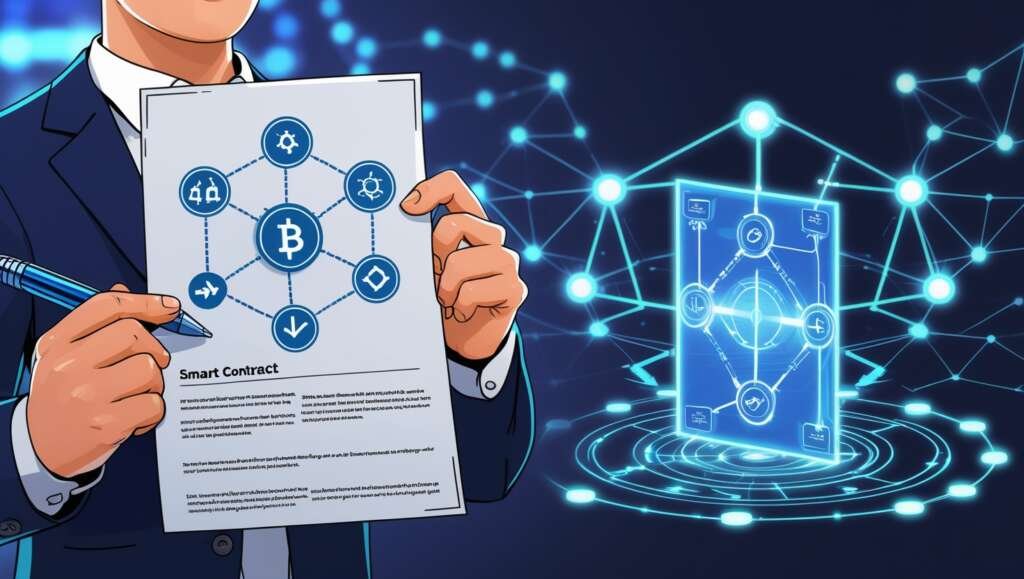Blockchain technology has been one of the most revolutionary innovations of the past decade, reshaping industries by providing decentralized, transparent, and secure systems. Although it was Bitcoin that first introduced the idea of a decentralized currency to the world, it was the creation of smart contracts that expanded blockchain’s capabilities beyond mere financial transactions. Smart contracts have enabled a shift from simple ledger systems to sophisticated decentralized applications (dApps), fundamentally changing the way agreements are created and enforced on the internet.
Smart contracts are computer programs that execute automatically on blockchain networks. They perform a set of predefined actions once specific conditions have been met. The term was originally coined by computer scientist Nick Szabo in the 1990s, who conceptualized them as digital protocols designed to enforce contract terms without the need for intermediaries.
Essentially, a smart contract functions much like a vending machine: you insert money, select a product, and receive it—no human intervention required. Similarly, in a smart contract, once the conditions are met (e.g., payment is made), the contract automatically executes the agreed-upon action (e.g., transferring ownership of a digital product).
Several blockchain networks have emerged to support smart contract development. These include Ethereum—the originator of programmable smart contracts; Binance Smart Chain (BSC)—a scalable, cost-effective alternative to Ethereum; and Solana—popular for its high transaction volume and fast processing times, among others.
Major Features of Smart Contracts
1. Autonomy
The smart contracts’ nature enables them to execute independently. That is, a smart contract will run by itself once the contract parameters have been met. Smart contracts are not reliant on human action. Free from human action, smart contracts eliminate delays while reducing the risk of manipulation or human intervention. Smart contracts only execute based on logic programmed into them.
2. Immutability
Once a smart contract has been deployed on the network, its code will not change. The immutability of the smart contract will ensure that the terms and the logic coded into the contract will be fixed and enforceable. The immutability ensures that no party will be able to modify the contract for their personal gain, thereby building trust in possible execution. But the immutability might be problematic where mistakes are done in coding the smart contract.
3. Deterministic
One of the most important characteristics of smart contracts is determinism. Under the same inputs and conditions, smart contracts will always produce the same outcome. Deterministic action is convenient and even necessary as we build predictable decentralized systems, which is particularly significant for financial or legal matters where precise outcomes are necessary.
4. Trustless Execution
Smart contracts make it unnecessary for the parties to trust one another or a third-party intermediary. Rather, trust is deposited in the code, which executes and enforces automatically and in an open way the terms of the agreement. Smart contracts minimize dependence on brokers, lawyers, or institutions; thus saving cost and time. Trustless execution is a fundamental aspect of the philosophy behind decentralization.
5. Transparency
Public blockchains implement smart contracts holding the code and the logic as revealed disclosures. That implies smart contracts share transparent code that is inspectable for validity prior to when users react to an agreement and a party. The transparency process imparts accountability and allows for trusting smart contract apps. Additionally, transparency will provide for auditing time, allowing programmers to go over smart contract code and enhancing overall security on smart contracts.
How Do Smart Contracts Function?
Smart contracts are coded in programming languages that are compatible with blockchain platforms. Solidity, for example, is used in Ethereum-based smart contracts.
Smart Contract Execution: How Sam Paid Mia Without a Middleman
Let’s say Sam needs a website for his freelance business, and he hires Mia to build it for 2 ETH. Now, instead of using a third-party service or manually sending funds after the work is done, they decide to use a smart contract on the Ethereum blockchain. Why? Because it keeps things fair, automatic, and trustless—no chasing payments or relying on outside help.
Setting the Terms in Code
The first step is to define the agreement. Sam and Mia agree that Mia gets paid once the website is finished and approved. This condition is written directly into a smart contract—think of it as a digital agreement that lives on the blockchain. Sam funds the contract by sending 2 ETH to it, and the contract holds that amount securely, like an escrow account.
With platforms available in 2025 like Thirdweb or OpenZeppelin’s Wizard, deploying a smart contract doesn’t require hardcore coding skills anymore. It’s easier than ever to lock in terms like “release funds to Mia only if Sam approves the work.”
Approval: The Key to Unlocking Payment
Once Mia finishes the website, she sends it over to Sam for review. If he’s happy with it, he opens his crypto wallet—like MetaMask or Coinbase Wallet—connects to the contract interface, and clicks a button to approve the work. Behind the scenes, that approval triggers a function in the contract that checks whether it’s really Sam giving the green light.
If everything checks out, the contract executes instantly. No need for a bank, no need for Mia to send a reminder email, and no awkward back-and-forth.
Funds Transfer—All On Autopilot
As soon as the smart contract registers Sam’s approval, it sends the 2 ETH directly to Mia’s wallet. There’s no delay, no processing period, and no human in the middle. The whole transaction is recorded on the blockchain, so it’s fully transparent and can’t be changed. It’s code doing exactly what it was written to do—automatically and fairly.
Sam and Mia’s arrangement is a perfect example of how smart contracts work in the real world. The agreement was clear, the condition was simple, and once that condition was met, the payment was handled automatically. No delays, no disputes, no middlemen—just transparent, secure, and efficient blockchain-powered automation. And with the latest tools and platforms, it’s never been easier to put this kind of technology to work, even if you’re not a developer.
Smart contracts are applied to numerous industries in order to decentralize and automate processes:
1. Decentralized Finance (DeFi)
Applications such as Aave, Compound, and Uniswap are all grounded on smart contracts to facilitate peer-to-peer lending, borrowing, and trading with no central intermediaries. For instance, a lending smart contract can automatically handle interest rate, loan issuance, and the collateral to be liquidated.
2. Supply Chain
Smart contracts can monitor goods and/or services from source to destination. Every stage of logistics (shipping, customs clearance, delivery) can initiate a smart contract event that enhances transparency and reduces scope for fraud.
3. Insurance
Smart contracts are proving useful for the automation of insurance claims. For example, a contract for flight delay insurance can be automatically triggered if there is a record that a specific flight has been delayed by a certain duration.
4. NFTs and Gaming
Smart contracts find application in games as part of the in-game economy to oversee asset ownership. Axie Infinity is one game that employs smart contracts to oversee game assets as well as a game economy. Smart contracts also find application on NFT platforms to oversee minting, buying, and moving digital collectibles.
The Place of Smart Contracts in the Evolution of Blockchain
1. From Currency to Programmable Blockchain
Bitcoin brought blockchain to the world in the form of a decentralized currency. But it was Ethereum’s launch of smart contracts in 2015 that turned blockchain into a platform for decentralized apps. This revolution allowed developers to create applications with embedded rules and logic — just like apps on conventional platforms, but without central control
2. Enabling Tokenization
Smart contracts enable any asset to be tokenized on the blockchain — real estate, art, music, or rewards points.
3. Enhancing Transparency and Accountability
As smart contracts are public for everyone on the blockchain, they enhance transparency. Anyone can audit the rules prior to engaging, which establishes trust in the system — notably in finance and government.
Challenges and Limitations
Despite their strengths, smart contracts have challenges as well. The following are the challenges and limitations:
1. Code Bugs and Security Vulnerabilities
After deployment, smart contracts are immutable, so bugs in such code cannot be corrected. Immutability has led to serious hacks, including the 2016 DAO hack. Vulnerabilities in code can result in losing millions of dollars’ worth of assets. Security audits and development with well-considered code can minimize such risks.
2. Questionable Legal and Regulatory Status
Smart contracts are by their nature global in reach, but legal validity will differ wildly from jurisdiction to jurisdiction. In most instances, it’s simply ambiguous that they would be legally enforceable. Uncertainty renders the resolution of disputes and compliance with current laws considerably difficult for a lot of companies, which bear risk until and unless laws are revised to allow smart contracts.
3. End-User Complexity
For end users, running smart contracts tends to involve technical knowledge and a sequence of cryptocurrency tooling. Even simple actions like using wallets or paying gas fees usually perplex end users. Moreover, it’s not typical for end users to be able to reverse user mistakes, which is unlike current trusted systems. Complexity is an actual barrier to user adoption and trust
4. There is no Built-in Legal Enforceability
Smart contracts may be able to run code, but they are incapable of comprehending or applying real-world context, intent, or legal subtlety. In the event of a dispute (e.g., whether or not a service was “satisfactory”), the contract cannot decide that without external assistance. PoS does nothing to bridge this gap—legal enforceability and smart contracts remain in largely different worlds.
Smart contracts fundamentally changed blockchain from just a concept of a financial ledger into a substantive decentralized application platform. Smart contracts eliminate intermediaries, lower costs, and automate certain steps of transaction processes in various industries, finance, real estate, gaming and supply chains.
The advent of smart contracts creates a landmark moment in the evolution of blockchain, where entire ecosystems such as DeFi and NFTs were made viable. Smart contracts are still working on issues/concerns such as legal validity, scalability and security, but the contours of the future are continually evolving through rapid innovation in the way we fundamentally think about and interact with smart contracts.
The truth is, smart contracts are not countries of code; they are the foundation of a decentralized future.




